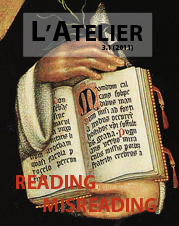"A strange, almost biblical feeling"
Keywords:
Adams, John, Goodman, Alice , Sellars, Peter , The Death of Klinghoffer , opéra, reading , pragmatics , ethics , politicsAbstract
The Death of Klinghoffer (1991), John Adams’s second opera, raises highy complex questions about the nature and function of the reading process. Although based on historical fact, it is less concerned with representing events than with narrating them; the question of mimesis takes second place to an examination of the dynamics of story-telling from the point of view of the cultivated reader who turns to historical accounts, literary texts or scriptural sources in an attempt to understand current events. Hermeneutics matter less than the pragmatics of reading in an opera whic recognizes that words can be as deadly as bullets. The Death of Klinghoffer recalls a recent episode in the conflict between Israelis and Palestinians; in other words, it refers to a situation in which a consensus on appropriate ways of reading history and Scripture is urgently needed, yet in which no such agreement appears possible for now: in this troubled context, any reading is potentially a misreading, so that ambiguity prevails. While Adams and his librettist Alice Goodman perceive the aesthetic implications of this state of affairs, they are fully aware that the real problem is ethical and political. As they are unable to suggest a practical solution, they resort to parody and exaggerate the uncertainties inherent in the reading process in an attempt to make the audience understand the true extent of the problem, which is the first step towards addressing it.Published
2011-04-30
Issue
Section
ARTICLES
License
- Work submitted for publication must be original, previously unpublished, and not under consideration for publication elsewhere. If previously published figures, tables, or parts of text are to be included, the copyright-holder's permission must have been obtained prior to submission.
- Authors of accepted manuscripts will assign to L'Atelier the right to electronically distribute their article, or publish it in any form (Internet, CD ROM, printed copy) but authors will retain copyright and, after the article has appeared in L'Atelier, authors may republish their text (in print and/or electronic form) as long as they clearly acknowledge L'Atelier as the original publisher.


